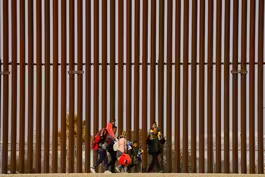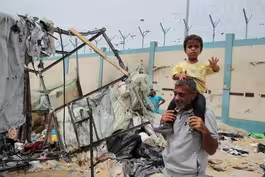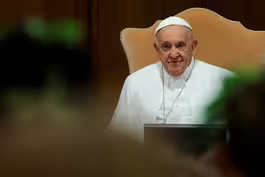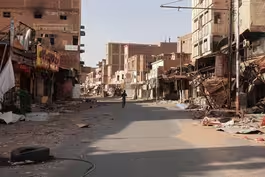
What happened during closing arguments in Trump's trial
Clip: 5/28/2024 | 7m 42sVideo has Closed Captions
What was said during closing arguments in Trump's hush money trial
The prosecution and defense made their final cases to jurors in the criminal trial against Donald Trump. Prosecutors argued Trump falsified business records to conceal an alleged affair that could’ve harmed his chances of becoming president. Trump’s defense team said the charges are baseless and the prosecution’s case relies on the testimony of an untrustworthy witness. William Brangham reports.
Problems playing video? | Closed Captioning Feedback
Problems playing video? | Closed Captioning Feedback
Major corporate funding for the PBS News Hour is provided by BDO, BNSF, Consumer Cellular, American Cruise Lines, and Raymond James. Funding for the PBS NewsHour Weekend is provided by...

What happened during closing arguments in Trump's trial
Clip: 5/28/2024 | 7m 42sVideo has Closed Captions
The prosecution and defense made their final cases to jurors in the criminal trial against Donald Trump. Prosecutors argued Trump falsified business records to conceal an alleged affair that could’ve harmed his chances of becoming president. Trump’s defense team said the charges are baseless and the prosecution’s case relies on the testimony of an untrustworthy witness. William Brangham reports.
Problems playing video? | Closed Captioning Feedback
How to Watch PBS News Hour
PBS News Hour is available to stream on pbs.org and the free PBS App, available on iPhone, Apple TV, Android TV, Android smartphones, Amazon Fire TV, Amazon Fire Tablet, Roku, Samsung Smart TV, and Vizio.
Providing Support for PBS.org
Learn Moreabout PBS online sponsorshipAMNA NAWAZ: Welcome to the "NewsHour."
In New York City today, both the prosecution and the defense made their final case to jurors in the criminal hush money trial of former President Donald Trump.
GEOFF BENNETT: Prosecutors reiterated the allegation that Donald Trump falsified business records to conceal news of an alleged affair that could have harmed his chances of becoming president.
For their part, Mr. Trump's defense team argued the charges are baseless, that no laws were broken, and that the prosecution's case relies on the testimony of an untrustworthy witness.
William Brangham has been following the trial from New York and joins us now.
So, William, per New York law, the defense offered its closing arguments first, and Donald Trump's team has long argued that these charges are baseless.
Overall, how did they try to persuade the jury to vote not guilty?
WILLIAM BRANGHAM: Geoff, Trump's lead lawyer, Todd Blanche, leaned into what you just referred to before, which is that, while we all call this the hush money case, it's really about this falsification of business records that are meant to cover up the hush money payment to Stormy Daniels that was made by Michael Cohen.
And Todd Blanche really leaned into that, telling jurors, this is not a hush money case, this is a paper case.
And he argued that Donald Trump had nothing to do with creating any of that paper.
That's the 34 charges here that are 34 different invoices, ledgers, checks and check stubs that are the -- central to this case.
And Blanche argued there's no clear evidence that Donald Trump created those, orchestrated those, knew anything about those.
There's no evidence that he did that with the intent to conceal anything, and certainly no evidence that he tried to do that to win an election.
He argued that "The National Enquirer" scheme, this whole catch-and-kill scheme that was set up back in 2016, was not illegal, that there - - that NDAs, these nondisclosure agreements, aren't illegal.
There's nothing wrong about them, in essence, and that they're quite common.
He also stressed -- and this was a key part of what he had to say -- is that the central witnesses here, Stormy Daniels partly, but Michael Cohen principally, simply cannot be trusted and that they had personal and financial reasons to make up stories about Donald Trump and his alleged scheme in all of this.
GEOFF BENNETT: Well, tell us more about that, William, because Michael Cohen is clearly the prosecution's key witness here.
How did Mr. Blanche try to undercut his testimony in particular?
WILLIAM BRANGHAM: Blanche spent a good deal of his time trying to do this and illustrated a whole series of examples of Michael Cohen lying, both in the past and allegedly on the stand in this particular case.
And the critical part of this is that there are cases where Michael Cohen in this case is the only one testifying to the centrality of Donald Trump's role in this alleged scheme.
So giving jurors a reason to doubt Michael Cohen is critical.
And so that was a huge part of his closing today.
Several times, Blanche would bring up examples of Cohen allegedly lying and then punctuate that by saying, that was a lie.
And Blanche actually gave Cohen his own special title for not telling the truth.
He said, you know how people call Tom Brady the GOAT, you know, the greatest of all time?
Michael Cohen is the GLOAT, the greatest liar of all time.
GEOFF BENNETT: Well, as we said this morning, the defense went first.
This afternoon, it was the prosecution's turn.
Give us a sense of how they have tried to recast to their case to the jury.
WILLIAM BRANGHAM: Recast is the right word, Geoff.
When -- while the defense focused on the financial records and how you can't trust Michael Cohen, prosecutor Joshua Steinglass quickly sketched out a much broader focus that he wants the jury to be thinking about.
And that is how these efforts, back in 2016, the catch-and-kill scheme with "The National Enquirer," and then separately with Stormy Daniels and the alleged cover-up of that, that those were all an effort to basically create a fraud on the American voting public, that hush money payments deprived voters of critical information that the prosecutors argue could have changed the course of that election.
Again, that is not what Trump is charged with here.
He's charged with these falsification of records.
And Steinglass did start getting into the granular detail of those today.
But prosecutors want jurors to see this first and foremost as an improper, illegal effort to protect then-candidate Trump and now protect, later protect President Trump.
GEOFF BENNETT: And, William, with the defense calling Michael Cohen the greatest liar of all time, how did the prosecution try to counter that narrative today?
WILLIAM BRANGHAM: That's right.
Steinglass spent a lot of time trying to do Michael Cohen image rehabilitation today.
He acknowledged, yes, he's a liar, yes, he's pled guilty to lots of lies, but that a lot of his evidence was backed up by cell phone data or other documentary evidence.
In a particularly cutting moment, Steinglass said -- and this I take it as a common line that prosecutors use -- is, he said, we didn't choose, we, the prosecutors, didn't choose Michael Cohen.
We didn't pick him up at the -- quote -- "witness store."
The defendant, Donald Trump, chose him as his fixer.
I mean, Steinglass noted that Trump's team has said, if Cohen was, in fact, making all of these stories up, why didn't he make up better stories?
Why didn't he tell a better lie that said Trump told Michael Cohen in some meeting, let's definitely cook up the books?
Steinglass said he didn't say those things.
Why?
Because he limited himself to what actually happened.
And so Steinglass argued that, after 2018, Cohen started telling the truth, and that has not changed.
GEOFF BENNETT: All right.
Well, in the time that remains, William, let's talk about the federal classified documents case against Donald Trump, because the special counsel, Jack Smith, his office was just denied a request for a gag order on Donald Trump following an extraordinary allegation that Donald Trump made.
Bring us up to speed on that.
WILLIAM BRANGHAM: Again, Geoff, extraordinary is absolutely the right word.
That's because, last week, Donald Trump accused President Biden of sending FBI agents to his home with the intent to assassinate him.
This all goes back to the execution of the search warrant that the FBI did looking for those classified documents two years ago.
And, as we know, they found many, many classified documents at Trump's home.
There were some documents that were recently unsealed this week.
And, in them, Trump seized on language that was basically boilerplate language about how the FBI executes these types of search warrants.
And even though they are completely routine, basic, sort of boilerplate language, Trump exaggerated what happened.
And he sent out a fund-raising e-mail.
I want to put this up.
It says: "Biden's DOJ was authorized to shoot me.
You know they're just itching to do the unthinkable.
Joe Biden was locked and loaded, ready to take me out and put my family in danger."
Again, there is no evidence that any of that was true.
Special counsel Jack Smith asked for a gag order, saying this is dangerous to federal agents.
The judge denied that gag order.
GEOFF BENNETT: William Brangham.
William, thanks so much.
We appreciate it.
WILLIAM BRANGHAM: Thanks, Geoff.
Biden considers temporarily closing border to curb crossings
Video has Closed Captions
Clip: 5/28/2024 | 6m | Biden considers temporarily closing southern border to curb flow of migrant crossings (6m)
How marijuana's reclassification could change drug policy
Video has Closed Captions
Clip: 5/28/2024 | 5m 35s | How marijuana's reclassification could change U.S. drug policy (5m 35s)
Israeli tanks reach central Rafah as outrage intensifies
Video has Closed Captions
Clip: 5/28/2024 | 9m 9s | Israeli tanks reach central Rafah amid outrage following deadly strike on refugee camp (9m 9s)
Poet Tayi Tibble draws on guidance of Polynesian ancestors
Video has Closed Captions
Clip: 5/28/2024 | 5m 25s | Māori poet Tayi Tibble draws on guidance of Polynesian ancestors in 'Rangikura' (5m 25s)
Pope apologizes for using slur while discussing gay clergy
Video has Closed Captions
Clip: 5/28/2024 | 5m 48s | Pope apologizes for using slur while discussing opposition to gay men in priesthood (5m 48s)
Sudan's civil war brings killings, torture, famine
Video has Closed Captions
Clip: 5/28/2024 | 7m 29s | Millions living through nightmare as Sudan's civil war brings killings, torture, famine (7m 29s)
Providing Support for PBS.org
Learn Moreabout PBS online sponsorship
- News and Public Affairs

FRONTLINE is investigative journalism that questions, explains and changes our world.

- News and Public Affairs

Amanpour and Company features conversations with leaders and decision makers.












Support for PBS provided by:
Major corporate funding for the PBS News Hour is provided by BDO, BNSF, Consumer Cellular, American Cruise Lines, and Raymond James. Funding for the PBS NewsHour Weekend is provided by...






